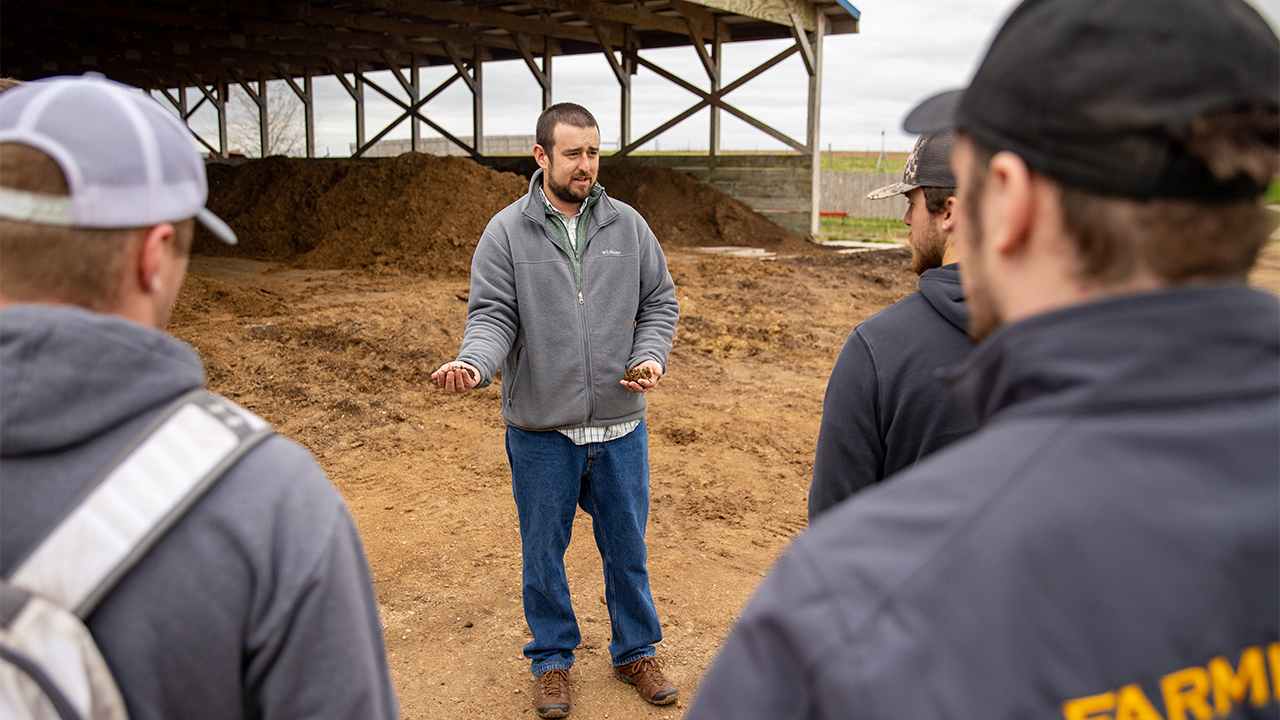
The University of Wisconsin-Platteville recently awarded five faculty research fellowships to increase dairy-related research capacity through the Dairy Innovation Hub initiative. Known as the Dairy Industry Impact Innovation Faculty Fellowships, or “DI3 faculty fellowships”, the selected faculty members will tackle research projects in the Hub’s four priority areas; stewarding land and water resources; enriching human health and nutrition; ensuring animal health and welfare; and growing farm business and communities.
Funded through a $7.8 million per year investment by the state of Wisconsin, the Hub harnesses research and development at UW-Madison, UW-Platteville and UW-River Falls campuses to keep Wisconsin’s $45.6 billion dairy community at the global forefront in producing nutritious dairy foods in an economically, environmentally, and socially sustainable manner. Since its launch in 2019, the Hub has funded more than 230 projects across the three campuses.
A faculty research fellowship is a temporary position for permanent faculty members. The goal is to provide support for a specific research project and any ancillary costs — including ensuring that the faculty member will have time to conduct the research and support for existing teaching responsibilities.
DI3 Faculty Fellowships are intended to leverage existing UW-Platteville expertise to provide timely results supporting the goals of the Dairy Innovation Hub, with an emphasis on addressing recommendations generated by the state’s Dairy Task Force 2.0, which completed its work in 2019.
The following UW-Platteville faculty fellows were selected for funding:
Raymond Pugh, Department of Chemistry
Pugh is an associate professor of chemistry at the UW-Platteville. His research focuses on crop responses to stress and signal transduction to determine effective strategies for maintaining our global food supply and combating invasive crop species. His project “Using seed priming to improve alfalfa feed quality and value” aims to improve alfalfa quality by increasing the level of mid to late-stage growth drought tolerance using seed priming methods, and thus improve alfalfa quality which means healthier cattle with increased milk production. This in turn can lead to increased sales of milk for dairy farmers and higher sale prices for hay. Read the full profile
Joseph Sanford, School of Agriculture
Sanford is an assistant professor in the School of Agriculture at UW-Platteville. His research interest is in agriculture wastewater management including farmstead and edge-of-field runoff, nutrient management, precision manure application, water recovery and recycling, pathogen inactivation and transport, and emerging agricultural contaminates such as PFAS. His position is funded by the Dairy Innovation Hub. His project “Establishment of long-term biochar research plots for evaluation of applications to dairy rotations” intends to establish biochar plots at UW-Platteville's Pioneer Farm to assess long-term benefits and risks of biochar applications. Biochar is a potential method for sequestering carbon in soil to improve sustainability and climate smart practices. However, there is insufficient knowledge regarding how biochar amendments impact crop production systems. Read the full profile
Md Mamunur Rahman, Department of Mechanical and Industrial Engineering
Rahman is an assistant professor of industrial and systems engineering at UW-Platteville. Rahman’s research interests include supply chain resilience, green logistics, and process improvement using computer simulation, optimization, and machine learning. His project “Precision livestock farming: harnessing data and machine learning for enhanced dairy calf health” aims to initiate a pilot project on Pioneer Farm employing precision dairy farming techniques to capture real-time data on calf temperature, feed and water intake behavior, and activity levels from the CowManager® system. Researchers plan to develop predictive machine learning models to forecast potential health issues. The anticipated outcomes of this project include real-time information for dairy farmers to institute preventive measures and enhance operational efficiency in dairy farming through optimized calf health management practices. Read the full profile
Zifan Wan, School of Agriculture
Wan is an assistant professor of animal, dairy and veterinary sciences at UW-Platteville. Her primary research interest is in the application of non-thermal technologies for enhanced food safety and quality to achieve sustainable manufacturing goals. In addition, her research focuses on the utilization of food by-products and wastes for production of value-added ingredients. Wan’s position is funded by the Dairy Innovation Hub. Her project “Improving the safety and utilization of organic fertilizer with high voltage atmospheric cold plasma treatment” will evaluate the efficacy of a plasma-activated liquid (PAL) treatment system to produce pathogen-free, nitrogen-enriched plasma-activated organic fertilizer (PAOF). This project holds significant benefits for dairy farmers by improving feed quality and sustainability, converting waste into valuable fertilizer, and supporting sustainable agricultural practices. Read the full profile
Yanwei Wu, Computer Science and Software Engineering
Wu is an associate professor of computer science and software engineering at UW-Platteville. She specializes in cybersecurity. Her project “Leveraging blockchain for data security in the dairy farm” aims to investigate how blockchain, a technology which provides a decentralized and immutable ledger for securely storing and managing data, can enhance data security in dairy farming. The ultimate goal is to develop specialized expertise in cybersecurity for the dairy industry to protect farmers’ data while making information accessible by service providers who need it such as veterinarians, nutritionists and more. Read the full profile